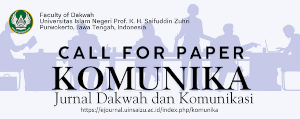EKSISTENSI AGAMA DALAM ERA GLOBALISASI
DOI:
https://doi.org/10.24090/komunika.v8i1.748Keywords:
globalization, religion, instrument of communication, political interaction.Abstract
This paper discusses the existence of religion in globalization era.Religious values, which are private, sacral, and transcendent, interact with theglobalization circle, which seems to be contradictory with religion.Globalization is utilitarian  as its nature and it results in vanish of local values or cultures. However, none can avoid, neither can religious people. Responds to globalization frequently occur in extreme behavior since some people thinks that globalization will threat their existence in this world. Such responds make the people labeled as fundamentalists or terrorists, and many of them have religious background.  Some of religious groups extremely rejecting globalization can be found states of former USSR, Japan, and Iran. Finally, this paper presents the forms and  positions of  religion suggested by four figures, i.e. Immanuel Wallerstein, John Meyer, Roland Robertson, and Niklas Luhmann. They suggest that the religions will keep their existence if they adopt the values of globalization and make themselves the instrument of communication as well as political and economic interaction of the world’s interaction. Religion should evolve from narrow mindedness to a broader, new, and universal values.Downloads
Download data is not yet available.
References
Beyer, Peter. 1994. Religion and Globalization. New Delhi: Sage Publication.
Cohen, Robin dan Paul Kennedy. 2000. Global Sociology. Hampshire and London: Macmillan Press.
Giddens, Anthony. 2001. Runaway World: Bagaimana Globalisasi Merombak Ke hidupan Kita, terj. Andry Kristiawan dan Yustina Koen S. Jakarta: Gramedia.
Hall, Stuart. 1994. The Question of Cultural Identity, dalam The Polity Reader in Cultural Theory. Cambridge: Polity Press.
Jary, David dan Julia Jary. 1999. Collins Dictionary of Sociology. Glasgow: Harper Collins Publishers.
Schement, Jorge Reina (ed). 2002. Encyclopedia of Communication and Informa tion, Volume 2. New York: Macmillan Reference USA.
Cohen, Robin dan Paul Kennedy. 2000. Global Sociology. Hampshire and London: Macmillan Press.
Giddens, Anthony. 2001. Runaway World: Bagaimana Globalisasi Merombak Ke hidupan Kita, terj. Andry Kristiawan dan Yustina Koen S. Jakarta: Gramedia.
Hall, Stuart. 1994. The Question of Cultural Identity, dalam The Polity Reader in Cultural Theory. Cambridge: Polity Press.
Jary, David dan Julia Jary. 1999. Collins Dictionary of Sociology. Glasgow: Harper Collins Publishers.
Schement, Jorge Reina (ed). 2002. Encyclopedia of Communication and Informa tion, Volume 2. New York: Macmillan Reference USA.
Downloads
Issue
Section
Articles
License
Authors who publish with this journal agree to the following terms:
- Authors retain copyright and grant the journal right of first publication with the work simultaneously licensed under a Creative Commons Attribution-ShareAlike 4.0 International License that allows others to share the work with an acknowledgement of the work's authorship and initial publication in this journal.
- Authors are able to enter into separate, additional contractual arrangements for the non-exclusive distribution of the journal's published version of the work (e.g., post it to an institutional repository or publish it in a book), with an acknowledgement of its initial publication in this journal.
- Authors are permitted and encouraged to post their work online (e.g., in institutional repositories or on their website) prior to and during the submission process, as it can lead to productive exchanges, as well as earlier and greater citation of published work (See The Effect of Open Access).

























